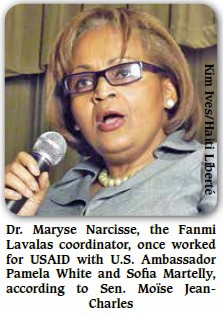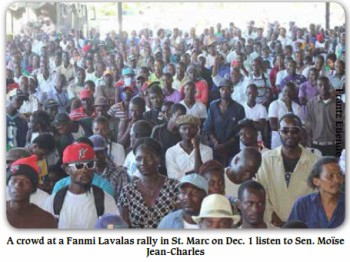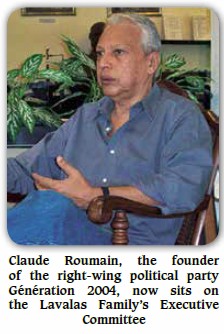|
 Last week, for the first
time in its history, the Fanmi Lavalas (Lavalas Family) party
publicly cast out two of its leading members. It hadn’t done
this for other prominent members, such as Dany Toussaint in
2003, Leslie Voltaire in 2004, or Mario Dupuy in 2011, all of
whom, in one way or another, betrayed the party by allying with
right-wing political enemies. Last week, for the first
time in its history, the Fanmi Lavalas (Lavalas Family) party
publicly cast out two of its leading members. It hadn’t done
this for other prominent members, such as Dany Toussaint in
2003, Leslie Voltaire in 2004, or Mario Dupuy in 2011, all of
whom, in one way or another, betrayed the party by allying with
right-wing political enemies.
Instead, the two
parliamentarians singled out in a Dec. 2 press statement have
been spearheading the growing nationwide uprising demanding the
resignation of President Michel Martelly and Prime Minister
Laurent Lamothe.
“The Fanmi Lavalas Political
Organization protests with all its might against any public
declaration which comes from some people who present themselves
as Fanmi Lavalas members, Senator Moïse Jean-Charles and Deputy
Arnel Bélizaire,” read the note signed by FL coordinator Dr. Maryse Narcisse and other Executive Committee members including
former deputy Lionel Etienne, businessman Joel Edouard “Pasha”
Vorbe, and former right-wing politician Claude Roumain.
Finally, a great schism, which
has been growing in the party for months, burst into the open.
The leaders of two currents – one accommodating, the other
confrontational – stood glaring at each other.
Sen. Moïse Jean-Charles
responded immediately to the note. The Fanmi Lavalas, he told
radio stations, has been taken over by a “macouto-bourgeois
group.” (The Tonton Macoutes were the Duvalier’s repressive
paramilitary force.)
“I have spoken with [former]
President [Jean-Bertrand] Aristide about it,” he said. “I told
him it is destroying the party. I told him that unless he made a
public declaration about it, I regret to say that the Fanmi
Lavalas will cease being a party which defends the masses’
demands. The bourgeoisie will simply take it over completely and
finish with it.”
Aristide’s response, according to Moïse: “I
am no longer involved in politics.” 
A Little History
Haiti’s Lavalas movement was born in the
1980s during the struggle against the Duvalier dictatorship and
the neo-Duvalierist juntas which followed Jean-Claude “Baby Doc”
Duvalier’s flight from the country on Feb. 7, 1986. The goal of
the movement was a national democratic revolution to break the
chains of dictatorship and of foreign domination which had
hobbled Haiti for decades.
Meaning “flood” in Kreyòl,
Lavalas was an apt term for the movement which brought out
rivers and seas of humanity in demonstrations which often ended
with the chant “Yon sèl nou fèb, ansanm nou fò, ansanm,
ansanm, nou se Lavalas.” (Alone we are weak, together we are
strong, together, together, we are the flood.) It also connoted
a movement that was cleansing, penetrating, and unstoppable.
The movement, which had been
largely guided by relatively untouchable Catholic priests (most
of them liberation theologians) under the Duvalier regime,
coalesced around then Father Aristide in his Salesian parish of
St. Jean Bosco in the Port-au-Prince slum of La Saline.
The popular wave finally
carried Aristide to the presidency in a Dec. 16, 1990 election,
with Washington-backed former World Bank economist Marc Bazin as
his principal rival.
Aristide spent most of his
first presidency in exile after a 1991-1994 U.S.-backed coup
d’état, but then founded the Fanmi Lavalas Political
Organization (he doesn’t like to call it a party) in November
1996, winning the presidency again under its banner in 2000.
Washington, with the help of
Canada and France, again helped remove Aristide through a coup
on Feb. 29, 2004, driving him ultimately into exile in South
Africa, from which he didn’t return until Mar. 18, 2011, two
days before a presidential election drew a record low 24% voter
participation in large part because the Fanmi Lavalas was
excluded. On his arrival, Aristide called for “inclusive
elections.” Former ribald konpa singer Michel Martelly
won the Mar. 20, 2011 polling, although Haiti’s Electoral
Council never ratified the vote, hence rendering it illegal.
Martelly Government Corruption
Although at first grudgingly tolerated by
the Haitian masses (“Let’s see what they can do” was the phrase
often heard at the time), Martelly’s regime over the past two
and a half years has become deeply unpopular after carrying out
a long list of illegal and provocative acts including: the
arrest of peaceful protesters, of Arnel Bélizaire (an
immunity-protected sitting deputy), and of plaintiffs in a suit
against government corruption; the unilateral taxing of
international money transfers and phone calls, the millions of
dollars in proceeds from which go into an opaque
presidential-controlled account; the formation of several
private right-wing militias; the release or protection of known
criminals who are close to the President; and the ramming
through of Constitutional changes and a bizarre, unlawful
electoral council.
But the most salient feature of
the regime is its unprecedented and unabashed corruption.
Highlights include: a $20,000 per diem for the President on his
frequent trips abroad, on which he takes his family and large
entourages who are given equally obscene per diems; 12
documented kick-back payments totaling $2.6 million from
Dominican Sen. Felix Bautista for post-earthquake construction
contracts; and the disappearance into thin air of another $100
million in post-earthquake international funds for rebuilding of
a devastated Port-au-Prince neighborhood, which still lies in
shambles.
The corruption centerpiece,
however, is the regime’s siphoning off of about $1 billion from a
fund filled by revenues from Venezuela’s provision of all
Haiti’s petroleum needs. Under the 2007 PetroCaribe agreement,
Haiti only has to pay from 40% to 70% of its oil bill up-front,
with the remainder going into a fund which has to be repaid over
the next 25 years at 1% interest. The Martelly government
“borrows” from that fund for an assortment of supposed poverty
alleviation programs with catchy names like Ede Pèp (Help
the People), Ti Manman Cheri (Dear Little Mother), Aba
Grangou (Down with Hunger), and Banm Limyè, Banm Lavi
(Give Me Light, Give Me Life). But the true beneficiaries, it
turns out, are Martelly cronies and family members, like his
wife Sofia and son Olivier, who pull down millions in salaries
for supposedly running these programs.
Enter Moïse
Leading the charge to denounce this
corruption, repression, and lawlessness has been Senator Moïse
Jean-Charles, who represents the North Department after having
served as the Lavalas mayor of Milot, the town beneath Henri
Christophe’s famed mountain-top Citadelle, a nationalist symbol.
Starting in late 2011, he began to take to Haiti’s airwaves
weekly to
bare the details of Martelly’s
malfeasance. Government officials and fellow
lawmakers would bring him juicy details of the Martelly regime’s
dirty dealings, and in Senate hearings, he would often grill squirming
government ministers on the patent disappearance of funds from
this or that project.
Moïse has also led the fight to
end the almost 10-year-old Washington-backed foreign military
occupation known as the UN Mission to Stabilize Haiti (MINUSTAH).
He stewarded two unanimous Senate resolutions setting deadlines
for withdrawal of the UN’s 9,000 troops (now set for May 28,
2014) and has traveled to Brazil, Argentina, and Uruguay to
lobby government officials and lawmakers, winning a 90-day
pull-out promise from the latter country’s president last month.
With an almost photographic
memory, a knack for numbers, and a charismatic presence even
over the radio, Moïse quickly became the people’s champion.
Deputy Arnel Bélizaire, who
comes from and represents some of the capital’s most rebellious
neighborhoods in Delmas, was also embraced by Haiti’s popular
organizations, not only because of his arrest, but because of
the progressive programming on his radio station RCH 2000 and
his single-handed disruption of several unpopular votes in
Haiti’s largely-bought-off House of Deputies.
Meanwhile, the Executive
Committee of the Fanmi Lavalas (FL) has remained completely mute
on the crimes and excesses of the Martelly government and
the continuing UN military occupation. “Inclusive elections”
became its one and only call.
Already the popular
organizations which make up FL’s base were not too enamored with
Dr. Maryse Narcisse, who had been Aristide’s and the party’s
spokesperson since 2007. (In May, at his first press conference
since returning to Haiti, Aristide announced that Narcisse would
be the FL’s new coordinator, making her likely the party’s next
presidential candidate.)
Dr. Narcisse, who was born into
Haiti’s bourgeoisie, had never militated in any popular
organization and was considered something of a outsider who had
been parachuted into her position of influence.
Furthermore, the FL’s Executive
Committee now included Claude Roumain, the former head of
Generation 2004, a right-wing party which had been allied in
1990 with Marc Bazin’s Movement for the Installation of
Democracy in Haiti (MIDH) in an electoral front known as the
National Alliance for Democracy and Progress (ANDP). When Bazin
became de facto Prime Minister in 1992 during the first
coup against Aristide, Roumain acted as his Secretary of State
for Youth and Sports. According to the pro-Lavalas website
ToutHaiti.com, Roumain was also a supporter of the 2004 coup
against Aristide.
Despite popular grumbling about
Narcisse, Roumain, and others on the Executive Committee and the
growing gulf between the leadership and its base, the party kept
up a brave face of unity.
Two Currents Emerge
As Moïse continued his crusade,
increasingly calls emerged from the Haitian masses through radio
programs and demonstrations for Martelly’s resignation.
The tipping point came in July.
In early 2013, a Haitian citizen, Enold Floréstal (now jailed),
initiated a lawsuit against Martelly’s wife and son for
corruption. The case was given to Investigating Judge Jean Serge
Joseph, who issued subpoenas for Lamothe and other high
government officials. Martelly was reportedly enraged by the
inquiry, and on Jul. 11, he ordered the judge to back off,
literally spitting curse-filled threats in his face. The secret
meeting, with Lamothe and Justice Minister Jean Renel Sanon also
in attendance, was held at the law offices of Martelly’s legal
counselor Garry Lissade, who had been the lawyer for 1991 coup
leader General Raoul Cédras at the 1993 Governor’s Island
negotiations in New York.
On Jul. 13, two days after
being chewed out by Martelly, the completely panicked Judge
Joseph died from a cerebral hemorrhage brought on either by
stress or poison. Both Martelly and Lamothe publicly and
repeatedly denied having ever met the judge or attended the
meeting at Lissade’s office. But both the Senate and House of
Deputies have
issued reports based on the
testimony of dozens of witnesses – co-workers, judges, security
agents, family members, etc. – detailing the meeting and the
regime’s threats, lies, and attempted cover-up.
Both reports, as well as a
resolution by 13 deputies and the entire Senate, called for
Martelly’s impeachment, and the firing of Lamothe and Justice
Minister Sanon. But any impeachment proceeding must be brought
by the House of Deputies, where the majority block – the
Parliamentarians for Stability and Progress (PSP) – is firmly in
Martelly’s pocket.
With the legal road blocked,
the masses have increasingly resorted to the streets to demand
Martelly’s resignation. At about the same time, Narcisse issued
a statement saying the FL was opposed to Martelly stepping down
before the end of his term. She called only for elections, and
during the summer, the party began to organize electoral
campaign rallies in towns around Haiti.
But tensions have grown when –
in towns like Mirebalais, Miragoâne, Port-de-Paix, St. Marc, and Aux Cayes
– Moïse has arrived and converted FL electoral rallies into
anti-Martelly mobilizations. His message was simple: no free,
fair, and sovereign elections are possible under Martelly and
foreign military occupation. The rallies usually end with the
crowds carrying Moïse away on their shoulders to shouts of
“Martelly out, MINUSTAH out,” leaving Narcisse and the Executive
Committee fuming.
The Last Straw
Huge anti-Martelly demonstrations were held
on Sep. 30, Oct. 17, and Nov. 7 in Port-au-Prince, Cap Haïtien,
and other provincial cities. At another giant anti-Martelly
demonstration on Nov. 18, Moïse announced a march on the U.S.
Embassy in the Port-au-Prince suburb of Tabarre for Nov. 29, the
anniversary of a 1987 election massacre.
Rumors spread on radios and
websites (but were never confirmed) that U.S. Ambassador Pamela
White had met with Aristide’s wife, Mildred, after the march was
announced.
Two days later, the FL
announced that on Nov. 29 that it would hold a march to lay
flowers at the Argentine School at Ruelle Vaillant, the site of
the worst bloodshed 26 years ago.
The two currents now stood
face-to-face. Whose call would the Lavalas popular organizations
and the masses heed?
On the morning of Nov. 29,
Venel Remarais of the FL-aligned Radio Solidarité and Haitian
Press Agency (AHP) issued a bitter editorial against the march
on the embassy, in which he accused Moïse (without naming him)
of being a “Rambo,” an “individual, a revolutionary with great
political ambition,” of suffering from “vertigo from having a
swollen head,” and of thinking “he is the center of everything.”
“It is in respecting the rules
of the game that all victory is possible, not in rebellion,
hot-headedness, and charging ahead,” Remarais said.
He even suggested that a
“rarely seen personality,” an apparent reference to Aristide,
might be at the Ruelle Vaillant
flower-laying.
In the end, only a few hundred
people turned out to the Executive Committee’s Ruelle Vaillant
demonstration, while many thousands marched on the embassy,
although Haitian police dispersed the demonstration with teargas
and gunshots in the air before demonstrators reached the
building. The people’s inclinations and allegiance were
clear.
The coup de grace came two days
later during a Dec. 1 FL rally in St. Marc. Moïse again
electrified the event, with a passionate speech calling on the
people to beware of “traitors who are in the National Palace,
who are in this crowd, who are everywhere... Veye yo, veye yo,
veye yo!” Keep an eye on them!
“We demonstrated and marched on
the National Palace [Sep. 30 & Oct. 17]. Then we went to see
Pétion in Pétionville [Nov. 7]. Then we decided to go visit
Uncle Sam, but a few of them didn’t want to come with us... For
their personal interests, they’re afraid of Uncle Sam. But since
we are the children of [Haiti’s independence war leader and
founding father Jean-Jacques] Dessalines, we are not afraid to
look [the Americans] in the eye. [The Americans] bombarded us
with their gunshots. But we’re going back there.”
Warned by other FL officials at
the St. Marc event about Moïse’s fiery speech, Narcisse and
other Executive Committee members decided not to even show up.
The next day they issued their note.
What Lies Ahead?
In his spirited response to the FL
Executive Committee, Moïse removed the gloves he’s worn for
months.
“Maryse Narcisse used to work
for USAID alongside Pamela White and Sofia Martelly,” Moïse told
Haïti Liberté. “It is no wonder she today adopts the
positions she does.”
“I have been twice elected
mayor of Milot under the Fanmi Lavalas banner,” he continued.
“People like Claude Roumain cannot put me out of a party which
they have never even belonged to.”
Meanwhile, Aristide has
maintained his silence, making no public statements in support
of either side.
The FL leadership appears ready to go into
municipal and partial Senate elections at some point in early 2014, as the
Martelly regime’s Electoral Council has promised and as the U.S.
would like. Washington has already kicked in $10 million and the
European Union 5 million euros for the election. The Deputies,
in extraordinary session, finally passed the long delayed
Electoral Law on Nov. 28. On Dec. 10, the National Palace
announced that the new law had been sent for promulgation in the
official journal, Le Moniteur.
Will the prospect of elections
break the mobilization to uproot Martelly? Will the FL
leadership enter into an agreement with the Martelly regime to
take part in elections, from which the party has been excluded
for the past decade?
“Anybody thinking of going into
Haitian elections with Martelly should look at the
blatant electoral fraud
just committed in Honduras,” said Henriot Dorcent, a leader of
the Dessalines Coordination (KOD), a political grouping which
organized a Sep. 29 Popular Forum
to come up with a formula for a post-Martelly provisional
government that could hold elections. The solution about 150
popular organization delegates came up with was very similar to
the transitional government which held Haiti’s highly successful
1990 elections which brought Aristide to power for the first
time.
“Martelly cannot even hold an honest Carnaval,”
quipped Moïse, referring to how the president illegitimately
intervened in the picking of bands for Haiti’s yearly
celebration. “How can he be expected to organize a fair
election, especially after all that we have seen he is capable
of doing?” |